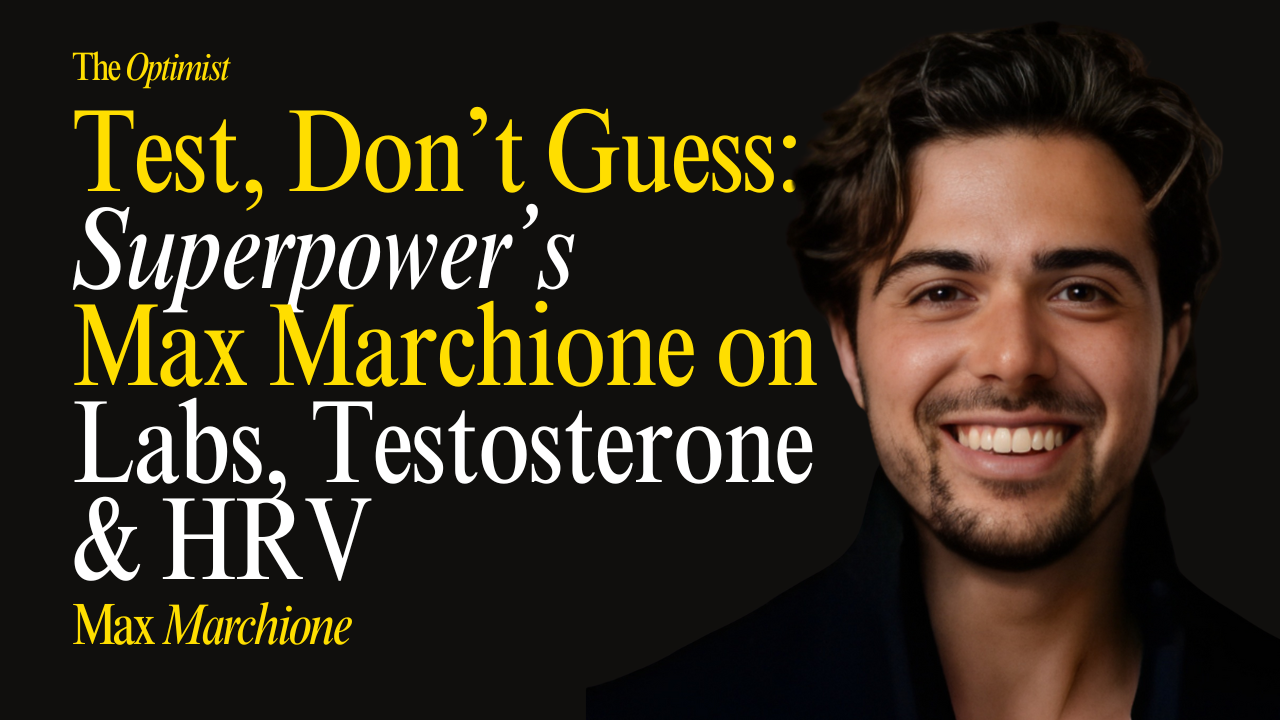"Hey man, you haven't fallen into conflict in 20 years? That's wild."
That's the question I asked Steve Cullen to open our first episode of The Optimist. His response would kick off a journey that completely transformed how I think about modern masculinity, leadership, and what it really means to be strong in 2024.
But let me back up.
The Match that Lit the Fire
I first met Steve at Mud/Wtr in Santa Monica, at one of those Friday morning community meetups. We were the two worst-dressed people in the room. I had brought my dog Dennis as a social buffer (pro tip: cute dogs are the ultimate networking hack), while Steve had rolled in straight from the gym.
We bonded over surfing and jiu-jitsu, discovered we worked out at the same gym, and eventually grabbed dinner a few weeks later. At the time, I was running my company Thursday Labs, going through relationship challenges, and trying to figure out how to be both a strong leader and a good partner - often feeling like I was failing at both.
The question that kept eating at me was this: How do elite performers - whether they're special forces operators, surgeons, or athletes - show up and execute at the highest level when their personal lives are in chaos? How do you give a make-or-break client presentation on Monday morning when you spent Sunday night sleeping on the couch after a relationship-shaking fight?
The Old Operating System: A Personal Confession
Let me paint you a picture of how I used to operate:
I'm on a Zoom call, ten minutes in, and I realize I haven't heard a single word. My mind is completely consumed by the fight from the night before. My girlfriend at the time and I had gotten into it over something that, in retrospect, was probably minor. But at the time, it felt like everything was falling apart.
This was my pattern: every conflict felt like a five-alarm fire. Every disagreement spiraled into days of tension. I was running on what I now realize was an outdated operating system - one with exactly two emotional settings: happy and angry.
Steve spotted this immediately. "You're so tightly wound as an entrepreneur," he told me later. "There was no cognitive energy left at the top anywhere for anything. Everything was like the fuse was burnt across the board."
The 30-Day Challenge That Changed Everything
That's when Steve prescribed something that sounded simultaneously simple and impossible: a 30-day no-conflict challenge. The rules were straightforward:
- Document every trigger that would normally cause conflict
- Don't engage in any conflicts
- Just shut up and observe
"Just try it," Steve said with a grin when I protested. "See what happens."
I lasted three days.
The first real test came when something genuinely bothering me came up with my girlfriend. I completely lost it, blasting her with all my pent-up frustrations. It went exactly as well as you'd expect - which is to say, terribly.
"Reset. New 30 days," I texted Steve.
His response? Radio silence. Message received.
The Second Attempt: What Actually Happened
This time, I committed fully. The first few days were uncomfortable - like trying to scratch an itch you can't reach. But then something fascinating started happening: I began noticing patterns in my reactions.
I kept a running log of everything that triggered me, but instead of acting on these triggers, I just documented them. What I discovered shocked me: about 99% of the things that felt crisis-level important in the moment, I had completely forgotten about 48 hours later.
By day 30, something even more surprising happened - I realized I was in what felt like an amazing relationship. Not because my partner had changed, but because I had stopped turning every minor friction into a major conflict.
The New Operating System in Action: Real World Tests
The principles I learned started bleeding into every area of my life. Let me share three specific stories that illustrate how this new operating system works in practice:
The New Hire Crisis
Four days into their role, a new hire sent me a panic-filled Slack message about being overwhelmed. My old operating system would have immediately jumped to: "They can't handle it. Bad hire. Need to fire them."
Instead, I took a breath and remembered Steve's advice: "Shut the fuck up for a second."
I suggested we take a call while I walked Dennis. During that call, instead of reacting, I just asked questions: "Talk to me. What's going on? What are you stressed about?"
By the end of the walk, we had not only resolved the immediate crisis but had actually strengthened our working relationship. They just needed to be talked off the ledge - to feel heard and supported rather than judged.
The Dog-Sitting Incident
When a friend stayed at my house to dog-sit, I had given him an extensive list of instructions about caring for Dennis. Despite this, I got a casual call while walking through the airport six hours into my trip: "Hey man, is it like a big deal if your dog's throwing up?"
My old system would have exploded. Instead, I noticed the surge of panic and chose not to act on it. When I returned home, my friend initiated a conversation about feeling my frustration during the week. Instead of dismissing it or getting defensive, I sat down and really listened.
It felt weird having such an emotionally intelligent conversation with a male friend - like using muscles I didn't know I had. But it worked. Our friendship actually grew stronger from what could have been a relationship-damaging incident.
The Client Presentation That Almost Wasn't
One of my toughest tests came during a high-stakes client presentation. The night before, I had barely slept due to personal issues. As I prepared to present, Steve's words rang in my ears: "Compartmentalization isn't about ignoring emotions - it's about integrating them."
Instead of trying to push down my feelings or pretend they didn't exist, I acknowledged them: "Yes, I'm stressed. Yes, I didn't sleep well. And yes, I can still show up and do this."
The presentation went better than any previous one - not despite my emotional awareness, but because of it.
The Business Case for Emotional Intelligence
Here's what I've learned running Thursday Labs: the modern business world desperately needs this new operating system. The old model of leadership - stoic, unquestioning, emotionally restricted - is dying. What's replacing it?
Leaders who can:
- Create psychological safety for their teams
- Navigate complex emotional dynamics
- Show strength through vulnerability
- Build genuine human connections
As Steve puts it: "The only person that gets fired is the one that fucks everybody over, not the one who didn't get the job done, not the one who's struggling, not the one that doesn't get it. The one that hides that and then tanks the project at the last second."
The Investment Thesis: Why This Matters Now
If we frame this as a startup opportunity (because hey, that's how my brain works now), here's what we're looking at:
The Problem:
- Young men are struggling to adapt to modern requirements
- Traditional masculine frameworks are insufficient
- Emotional intelligence is now a core professional skill
- Mental health issues are rising among men
The Solution:
- New operating system that preserves core values
- Updated implementation for modern context
- Practical tools for emotional intelligence
- Community reinforcement of healthy masculinity
The Market:
- Every man trying to navigate modern life
- Every company wanting better leaders
- Every relationship needing better communication
- Every family wanting better fathers
What I've Learned: The New Strength Stack
After 90 days of practicing this new operating system, here's what I've discovered about modern strength:
- The Power of the PauseWhen someone comes at you with intense emotion, the strongest move is often to ask "Are you okay?" Instead of defending or attacking, create space for understanding.
- The Strength in SilenceAs Steve taught me, sometimes the most powerful response is simply to shut the fuck up. Not as submission, but as a conscious choice to create space for better solutions.
- The Courage to Be CuriousReal strength isn't about having all the answers - it's about having the confidence to ask questions and truly listen to the answers.
- The Freedom to FeelUnderstanding that having emotions doesn't make you weak - it makes you human. The strength comes in how you process and respond to those emotions.
Where We Go From Here
I'm turning 30 in a few months, and I'm just starting to understand what it really means to be a strong man in 2025. It's not about being fearless - it's about being brave enough to feel fear and move forward anyway. It's not about never making mistakes - it's about having the security to admit when you're wrong.
As Steve told me over that first steak dinner, the core mission of what it means to be a man hasn't changed: provide and protect. But in 2025, that means:
- Providing emotional safety, not just financial security
- Protecting through understanding, not just physical strength
- Leading through influence, not just authority
- Building up others instead of comparing ourselves to them
The Final Word
The most profound moment in my conversations with Steve came when he shared his three core values: service, courage, and wisdom. "So long as you put service first," he said, "you're probably being a good man."
That's the real secret to the new masculine operating system. It's not about being perfect. It's not about never having conflicts. It's about showing up, being present, and using your strength to make life better for others.
And sometimes, it's about knowing when to shut the fuck up.
For more deep dives into modern masculinity and men’s mental health, subscribe to The Optimist. And if you found this valuable, share it with a man in your life who might need it.

.svg)

